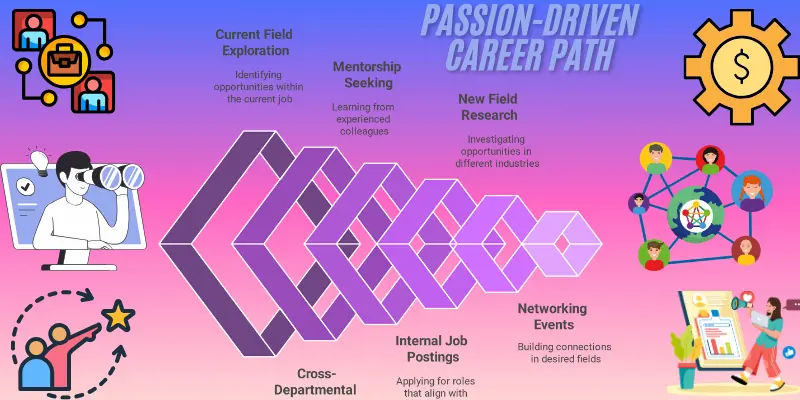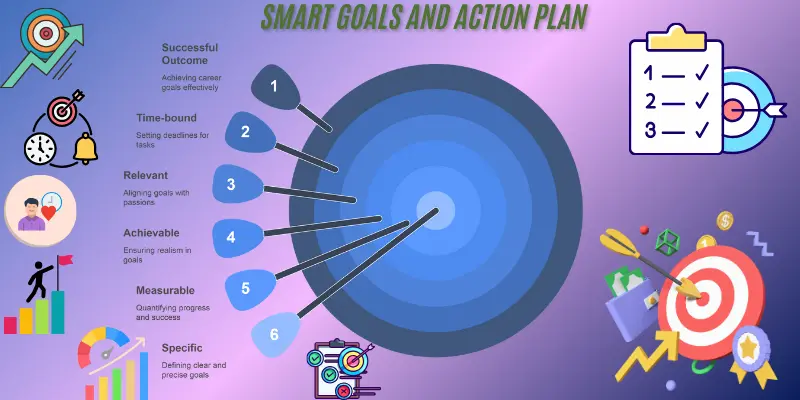How to Build a Career That Aligns with Your Passions (Without Quitting Your Job)
Published: 27/03/2025
Feeling Stuck in Your Job? You’re Not Alone.
Did you know that 70% of employees feel disengaged at work? If your job feels uninspiring but quitting isn’t an option, you’re not alone. Many professionals crave work that excites them but feel trapped by financial responsibilities and job security.
The good news? You don’t have to choose between passion and stability. It’s possible to bring more meaning into your career without making a drastic leap.
Why Aligning Your Career with Your Passions Matters
When your work reflects what you truly enjoy, everything changes:
- Higher job satisfaction—You feel more engaged and motivated.
- Increased creativity & energy—Work feels more fulfilling, not just another task.
- Better mental well-being—Less stress and burnout, more purpose.
Ignoring your passions, on the other hand, can lead to frustration, boredom, and lack of growth.
What You’ll Learn in This Post
You don’t need to quit your job to start building a career that excites you. In this post, we’ll cover:
- How to identify your passions and connect them to your current job.
- Ways to integrate meaningful work without a major career change.
- Practical steps to upskill and explore new career paths while staying financially secure.
- How networking and strategic planning can help you transition smoothly.
Take the First Step Today
If you’ve ever felt torn between passion and security, this guide is for you. By the end, you’ll have clear, actionable steps to make your work more fulfilling—without walking away from your paycheck.
Ready to take control of your career? Let’s get started. 🚀
Discover What Makes You Tick: Uncovering Your True Passions
Think of discovering your passions like finding the perfect pair of shoes. At first, you might not know exactly what style fits you best. But as you try on different options, you start to notice what feels comfortable and what doesn’t. Understanding your passions is just like that—taking the time to explore what excites you, makes you feel alive, and helps you shine.
Start with Self-Reflection: The First Step to Finding Your Passion
Imagine you’re trying to figure out what you want for dinner. You wouldn’t just pick something random; you’d think about what sounds good, what you’re in the mood for, and what will make you feel satisfied. Discovering your passions is a lot like that. You need to reflect on what lights you up.
Here’s how you can start:
- Journaling: Write down your thoughts, like a personal food diary—but for your feelings. What activities make you lose track of time? What could you do for hours and not get bored?
- Personality Tests: Taking a test, like the Myers-Briggs or StrengthsFinder, is like getting a recipe for understanding yourself better. These tests help you figure out what natural strengths you have, which can give you clues about your passions.
For example, let’s say you love storytelling and enjoy helping people solve problems. If that sounds like you, then a career in content creation or teaching might be a perfect fit. It’s about connecting the dots between what excites you and what you’re naturally good at.
Identifying Transferable Skills
Now that you’ve figured out what excites you, let’s talk about the skills you already have. Imagine you’ve got a toolbox. Inside, you’ve got a bunch of tools you can use for different tasks. These tools are your transferable skills—things like communication, problem-solving, and leadership.
Let’s break it down:
- Communication: You might be great at explaining things clearly to your friends or co-workers. That’s a skill that can transfer into almost any job.
- Problem-solving: If you can figure out solutions to challenges, you’re a natural at troubleshooting—whether it’s at work or at home fixing something.
So, if you’re really good at organizing, for example, you could transition into project management or even event planning. It’s about seeing how your existing skills can apply in new ways. Just like you wouldn’t use a hammer to screw in a nail, your skills may be adaptable to different career paths—but the core ability is the same.
Passion isn’t something you find—it’s something you uncover through experimentation. Try new things, reflect on what energizes you, and the patterns will emerge.Dr. Marcus Lee, Organizational Psychologist
Chart Your Path: Researching Careers That Match Your Passions
When you’re looking to align your career with your passions, it’s essential to do some digging. Whether you decide to explore opportunities within your current field or look into something new, researching your options can help you discover the best path for you. Think of it like planning a road trip—you need a map, but the journey is yours to make.

Exploring Options Within Your Current Field
If you already have a job you like, but you’re not sure how to make it align with your passions, start by looking within your current workplace. It’s like rearranging the furniture in your home—sometimes, a small change can make everything feel new again.
Here are a few tips:
- Volunteer for cross-departmental projects: Working with different teams within your company can open up new perspectives and experiences. You might find yourself enjoying a new type of work you hadn’t thought of before.
- Seek mentorship: Find someone in your company who is already doing what you aspire to. They can give you advice, guidance, and share their own journey.
- Look for internal job postings: Sometimes, a different role within your company can bring you closer to your passions. Keep an eye out for positions that might align with what excites you.
For example, if you love problem-solving and creativity but are stuck in a routine role, volunteering for a project that requires brainstorming or innovative thinking could be the perfect chance to flex those muscles.
Exploring New Fields
If you feel like your current field just isn’t for you, it might be time to step outside the box and explore new industries. Just like switching gears in a car, moving into a different field can give you a fresh start.
Here’s how to go about it:
- Read industry publications: Start by checking out blogs, journals, and magazines in industries that interest you. They’ll give you a sense of the trends, demands, and opportunities in the field.
- Attend networking events: Whether in-person or online, networking events are great places to meet people who can provide insider knowledge and open doors.
- Take online courses: Platforms like Coursera or Udemy offer short courses that can help you get a feel for a new field without fully committing. It’s like taking a test drive before buying a car.
Researching new industries can be a game-changer, giving you the tools and confidence to make a smooth transition into a career that truly sparks your passion.
Plan Your Path: Turning Career Goals into Action
Developing a plan is essential to turning your career goals into a clear, actionable path. It helps transform your big, exciting vision into manageable tasks that you can work through step by step. A well-structured plan gives you direction and focus, ensuring you stay on track as you move closer to your goal.

Set SMART Goals: Your Roadmap to Success
Setting goals is like baking a cake—you need the right ingredients, the right amount of time, and a recipe to follow. SMART goals act as your recipe, ensuring that everything is clear and achievable so you don’t end up with a half-baked idea.
Here’s how to set SMART goals:
- Specific: It’s like choosing the flavor of your cake. You wouldn’t bake a cake without deciding if it’s chocolate, vanilla, or something else. Make your goal as specific as possible. For example, instead of “I want a new job,” say “I want to transition into a marketing role by the end of the year.”
- Measurable: Think of this like measuring ingredients for your cake. You need to know how much you’re using, so you know when you’ve got it right. For instance, “I will complete two digital marketing courses in the next three months.”
- Achievable: Don’t try to bake a three-tiered cake if you’ve never baked before. Make sure your goal is realistic. For example, “I’ll dedicate 5 hours a week to learning marketing skills” is a manageable goal.
- Relevant: The ingredients need to match the cake you’re making. Ensure your goal ties into what you’re passionate about. For example, “Marketing excites me because I love being creative and analyzing trends.”
- Time-bound: Set a timer. Like baking, goals need to have a deadline. A goal like “I will apply to 5 marketing jobs by the end of the month” gives you a clear timeframe to work with.
By using the SMART goal recipe, you’ll have a clear, actionable plan for success.
Creating a Step-by-Step Action Plan
Creating a step-by-step action plan is like following a workout routine—it’s about breaking down your bigger goal into smaller, achievable moves so you can see progress without burning out. You wouldn’t run a marathon without training, and you shouldn’t tackle your career goals without taking small, planned steps.
Here’s how to break it down:
- Start small: Just like you wouldn’t try to run 10 miles on day one, start with one small task you can handle this week. It might be signing up for an online course or researching companies in your desired field.
- Prioritize tasks: Imagine you’re building a house—you wouldn’t put the roof on before the foundation. Tackle the most important tasks first. If learning new skills is your priority, focus on that before jumping into applying for jobs.
- Set realistic timelines: Just like you wouldn’t try to bake a cake in 5 minutes, break your goals into smaller tasks with clear, manageable timeframes. For example, “I’ll study for one hour every Tuesday and Thursday evening.”
- Stay flexible: Sometimes the cake might burn, or the road might have detours. Life can throw curveballs, but don’t let it derail you. Adjust your plan and keep moving forward.
For example, if your goal is to land a marketing role in six months, your action plan might look like:
- Complete two online marketing courses by the end of the month.
- Revamp your resume and LinkedIn profile in the next week.
- Apply for 3 jobs every week for the next two months.
By breaking down your goal into small steps and setting realistic timelines, it’s easier to stay on track
Level Up: Gaining the Skills and Experience You Need
Building the right skills and gaining hands-on experience are crucial steps in aligning your career with your passions. Whether it’s learning something new or taking on more responsibilities in your current role, actively working on your growth will help you move forward with confidence.
Upskilling and Reskilling
Continuous learning is essential for staying relevant and improving your career prospects. Whether you’re refining your current skills (upskilling) or learning something entirely new (reskilling), investing in education can open up new opportunities.
Here’s how to get started:
- Take online courses: Platforms like Coursera, Udemy, and LinkedIn Learning offer a variety of courses across different industries.
- Earn certifications: Industry-recognized certifications, such as Google Analytics for marketing or PMP for project management, can boost your credentials.
- Attend workshops and seminars: Look for training sessions, both online and in-person, to gain hands-on experience.
- Read industry blogs and books: Keeping up with trends through reading helps you stay informed and competitive.
By consistently learning and improving, you make yourself a stronger candidate for opportunities that align with your passions.
Seeking Opportunities for Growth
Experience isn’t just about formal education—it’s also about taking initiative and applying what you learn in real-world situations. Finding ways to grow within your current role can help you build credibility and expand your skill set.
Ways to gain experience at work:
- Volunteer for new projects: Look for opportunities that align with your interests and challenge you to grow.
- Take on leadership roles: Even small leadership tasks, like mentoring a junior colleague or leading a meeting, can help build confidence.
- Propose new initiatives: If you have an idea that could improve a process or benefit your team, take the lead and pitch it.
- Seek feedback and mentorship: Learning from experienced professionals can provide valuable insights and accelerate your growth.
By actively seeking out growth opportunities, you not only gain new skills but also position yourself for career advancement in areas that genuinely excite you.
The Art of Networking: Turning Contacts into Career Opportunities
Networking is one of the most effective ways to discover new opportunities and advance your career. Building strong professional relationships can open doors to mentorship, job referrals, and industry insights. Whether you’re leveraging your existing network or making new connections, maintaining meaningful relationships can help you align your career with your passions.
Leveraging Your Network
Your current network—friends, colleagues, former managers, and industry contacts—can be a valuable resource in your career journey. Instead of starting from scratch, use these connections to gain insights, find new opportunities, and seek guidance from those with experience.
How to make the most of your network:
- Reach out to mentors and former colleagues: Ask for advice, industry trends, or potential job leads. A simple message like, “Hey, I’m looking to transition into [field]. Do you have any advice or insights?” can start a productive conversation.
- Stay active on LinkedIn: Engage with posts, share your thoughts, and message professionals in your industry.
- Join alumni or professional groups: Many schools and organizations have networking groups that provide career support and job referrals.
- Offer value in return: Networking is a two-way street. Share useful information, make introductions, or offer your expertise to strengthen relationships.
By tapping into your existing connections, you can gain valuable guidance and uncover new opportunities without having to navigate your career path alone.
Building New Connections
Expanding your network is like planting a garden—the more seeds you plant, the greater the chances of opportunities growing. Each new connection can bring fresh insights, career prospects, and valuable mentorship. Like a well-tended garden, networking requires consistent effort, relationship nurturing, and patience to yield results.
Ways to build new connections:
- Attend industry events and conferences: These gatherings provide direct access to professionals in your field. Prepare a few talking points or questions to make conversations easier.
- Join professional organizations: Groups related to your industry often host networking events, webinars, and mentorship programs.
- Participate in online forums and communities: Platforms like LinkedIn Groups, Reddit, and industry-specific forums are great places to meet like-minded professionals.
- Engage in local meetups: Many cities have career-focused meetups where professionals connect and share experiences.
Building new connections isn’t just about adding contacts—it’s about cultivating relationships that can help you learn, grow, and find opportunities in your career. Keep planting seeds, and over time, you’ll watch your professional network flourish.
Tackling Challenges: How to Stay on Track Toward Your Passion
Every career journey comes with obstacles, but the key to success is learning how to navigate them effectively. Whether it’s battling self-doubt or managing time between your job and passion projects, overcoming these challenges will help you stay on track and make meaningful progress.
Dealing with Self-Doubt
Self-doubt can hold you back from pursuing opportunities and reaching your full potential. Instead of letting it control your decisions, take proactive steps to build confidence and shift your mindset.
Here’s how to manage self-doubt:
- Use positive affirmations: Remind yourself of your strengths by repeating affirmations like, “I am capable,” or “I have valuable skills to offer.”
- Visualize success: Picture yourself achieving your goals. Visualization can boost confidence and make challenges feel more manageable.
- Seek support: Talk to mentors, friends, or colleagues who can offer guidance and reassurance. Sometimes, an outside perspective helps reframe doubts.
- Reflect on past achievements: Keep a list of accomplishments, big or small, to remind yourself of what you’ve already overcome.
By actively working on your confidence, you’ll be better equipped to take on new challenges without hesitation.
Balancing Current Job and Passion Projects
Managing a full-time job while pursuing passion projects can feel overwhelming, but with the right approach, it’s possible to make steady progress without burning out. The key is effective time management and setting clear boundaries.
Here’s how to find balance:
- Set dedicated time slots: Schedule specific times each week to work on your passion projects, just like you would for a meeting or appointment.
- Prioritize tasks: Identify the most important activities and focus on what will bring you the most progress.
- Avoid burnout: Make time for rest and self-care. Overworking yourself can slow progress in both your job and passion projects.
- Communicate your boundaries: If possible, set limits at work to ensure you have personal time to invest in your interests.
By structuring your time wisely and staying consistent, you can make meaningful progress toward your passions while keeping your professional responsibilities in check.
How Organizations Can Support Passion Alignment
Aligning careers with passions isn’t just an individual effort—organizations play a key role too. By creating supportive environments, companies can help employees thrive while boosting retention and productivity. Here’s how:
Mentorship Programs
- What It Is: Pairing employees with mentors who align with their passions and career goals.
- Why It Matters: Mentors provide guidance, share experiences, and help employees navigate career transitions.
- Example: A marketing professional passionate about data analytics is paired with a senior data scientist for mentorship.
Flexible Roles
- What It Is: Allowing employees to explore cross-functional projects or roles within the organization.
- Why It Matters: Flexibility helps employees discover new interests and apply their passions in different contexts.
- Example: An engineer interested in UX design is given the opportunity to collaborate with the design team on a project.
Skill-Building Initiatives
- What It Is: Offering training programs, workshops, or tuition reimbursement for skill development.
- Why It Matters: Upskilling helps employees bridge the gap between their current roles and their passions.
- Example: A company provides free access to online courses in digital marketing for employees interested in transitioning to marketing roles.
Conclusion:
Aligning your career with your passions isn’t just a dream—it’s a process that requires self-reflection, strategic planning, continuous learning, and proactive networking. By taking intentional steps, you can build a career that excites and fulfills you.
A quick recap of the most important steps to help you align your career with your passions and make meaningful progress.
- Know Yourself: Take time for self-reflection and identify what truly excites you. Use journaling, personality tests, and self-assessments to gain clarity.
- Recognize Transferable Skills: Many of your existing skills can apply to different roles or industries. Understanding them opens more career possibilities.
- Explore Career Options: Look within your current company for roles that align with your passions, or research new industries that fit your interests.
- Set SMART Goals: Having clear, actionable, and time-bound goals helps you stay on track and measure progress effectively.
- Create an Action Plan: Break down your career transition into manageable steps to make steady progress without feeling overwhelmed.
- Invest in Learning: Upskilling and reskilling through courses, certifications, and workshops can make you more competitive in your chosen field.
- Seek Opportunities for Growth: Volunteer for new projects, take on leadership roles, and look for ways to apply your passions in your current job.
- Leverage and Expand Your Network: Use your existing connections for guidance and actively build new relationships through networking events and professional communities.
- Overcome Challenges: Self-doubt is natural, but confidence comes with action. Manage your time wisely to balance work and passion projects without burnout.
Building a career that aligns with your passions takes intentional effort, patience, and persistence. Small, consistent steps will move you closer to work that excites and fulfills you. Stay flexible, embrace new opportunities, and most importantly—trust yourself. Your passion-driven career isn’t just possible; it’s within reach.
Let’s Keep the Conversation Going!
What’s one step you’re taking today to align your career with your passions? Share your thoughts in the comments below!
Have questions or need further guidance? Drop them in the comments—I’d love to help!
“Your career is a journey, not a destination. Don’t be afraid to pivot, explore, and align your work with what truly excites you.”Richard Branson, Founder of Virgin Group
Curious About Passion-Driven Careers? Here Are the Answers to Your Top Questions
Yes! You can start by identifying your passions, finding ways to incorporate them into your current role, and gradually upskilling or exploring side projects that move you toward your ideal career. Small, consistent steps can lead to big changes over time.
Start with self-reflection—think about activities that energize you or topics you’re naturally drawn to. Journaling, personality tests, and feedback from friends or mentors can help you gain clarity.
Look for projects or tasks within your role that align with your interests. You can also volunteer for cross-departmental projects, propose new initiatives, or suggest changes that align more with what you enjoy doing.
Not necessarily. Online courses, certifications, workshops, and self-learning resources can help you gain the skills needed for a transition without committing to a formal degree.
Set aside dedicated time each week, even if it’s just a few hours. Prioritize tasks, set boundaries to avoid burnout, and make steady progress without overwhelming yourself.
Yes! Many people start passion projects as side gigs before transitioning full-time. Test the waters by freelancing, consulting, or selling products/services part-time before making any big career moves.
Self-doubt is normal, but it shouldn’t stop you. Use positive affirmations, visualize success, seek mentorship, and remind yourself of past achievements to build confidence.
Common mistakes include waiting for the “perfect time,” ignoring transferable skills, setting vague goals, neglecting continuous learning, and trying to rush the process without a clear plan.
Networking is crucial. Connecting with professionals in your desired field can provide valuable insights, mentorship, and even job opportunities that align with your passions.
Not all passions need to be your full-time job. You can still pursue them as hobbies, side projects, or creative outlets while maintaining a stable career. If you want to turn it into a career, research ways to monetize your passion in a sustainable way.

- Be Respectful
- Stay Relevant
- Stay Positive
- True Feedback
- Encourage Discussion
- Avoid Spamming
- No Fake News
- Don't Copy-Paste
- No Personal Attacks

- Be Respectful
- Stay Relevant
- Stay Positive
- True Feedback
- Encourage Discussion
- Avoid Spamming
- No Fake News
- Don't Copy-Paste
- No Personal Attacks





